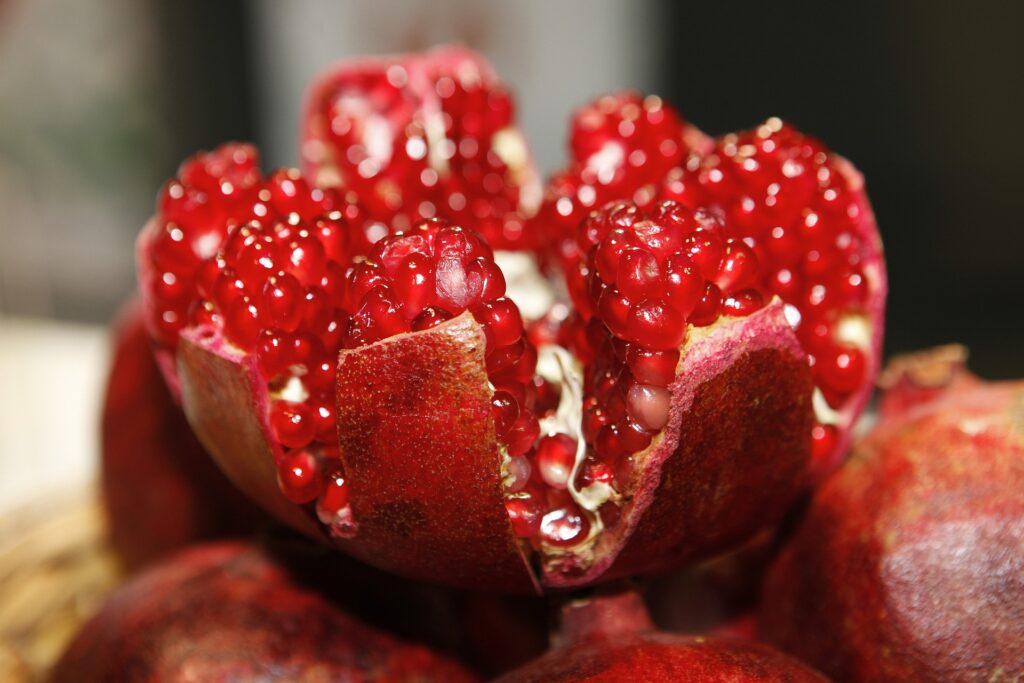
Table of Contents
Overview
Pomegranates are known for their vibrant red color and jewel-like seeds, which pack a powerhouse of nutrients and antioxidants. With a long history of being associated with health and vitality, pomegranates are often touted as a superfood that offers numerous health benefits. Whether consumed as fresh fruit, juice, or supplement, pomegranates have a wide array of potential health benefits that can improve everything from heart health to skin glow.
But, like any food, they also come with certain risks. In this post, we’ll explore both the benefits and the potential risks associated with pomegranates, while offering tips on how to include them in your daily diet
Nutritional of Pomegranates
Before diving into the health benefits, it’s important to understand the impressive nutritional profile of pomegranates. Just one cup of pomegranate arils (seeds) contains
- Fiber: 7 grams
- Protein: 3 grams
- Vitamin C: 30% of the recommended daily intake (RDI)
- Vitamin K: 36% of the RDI
- Folate: 16% of the RDI
- Potassium: 12% of the RDI
Pomegranates are also loaded with antioxidants, especially punicalagins and punicic acid, which are responsible for most of their health-boosting properties. These antioxidants help protect your cells from oxidative stress and inflammation.
Health Benefits of Pomegranates
Rich in Antioxidants
Read more : Health Benefits of Lima Beans
Pomegranates are incredibly rich in antioxidants, substances that can help neutralize free radicals in the body. Free radicals are harmful molecules that can damage cells and contribute to aging and diseases such as cancer. The antioxidants found in pomegranates, particularly punicalagins, are known for their anti-inflammatory properties.
In fact, studies suggest that the antioxidant activity in pomegranate juice is higher than in red wine or green tea, two other well-known sources of antioxidants
Boosts Heart Health
Pomegranates have been linked to improved heart health, particularly by helping lower blood pressure and cholesterol levels. The antioxidants in pomegranates help reduce oxidative stress, which is a significant factor in heart disease.
Additionally, consuming pomegranate juice has been shown to reduce LDL cholesterol (often referred to as “bad” cholesterol) and increase HDL cholesterol (the “good” kind). This balance is crucial for maintaining overall heart health and preventing the build-up of plaque in arteries, which can lead to atherosclerosis—a condition that increases the risk of heart attacks and strokes.
Supports Digestive Health
Pomegranates are a great source of dietary fiber, which plays a crucial role in maintaining healthy digestion. Eating pomegranate seeds can aid in the regulation of bowel movements and prevent constipation. Additionally, fiber promotes the growth of healthy bacteria in the gut, which is essential for a strong immune system and efficient nutrient absorption.
However, it’s important to consume pomegranate seeds in moderation, as overeating fiber-rich foods too quickly can cause gastrointestinal discomfort.
Anti-Cancer Properties
Emerging research suggests that pomegranates may have anti-cancer properties. The antioxidants and polyphenols in pomegranates can slow the growth of cancer cells and reduce the risk of cancer progression.
In particular, studies have shown that pomegranate extracts can inhibit the growth of prostate cancer cells and help reduce the risk of breast cancer by blocking certain enzymes involved in cancer progression. While more research is needed, these findings are promising and highlight pomegranates as a potential tool in cancer prevention
Promotes Skin Health

The high antioxidant content in pomegranates makes them a fantastic food for skin health. The antioxidants help fight free radicals that can lead to premature aging, including wrinkles and sun damage
Morning Habits to Help You Lose Weight: Start Your Day Right
Pomegranate oil, in particular, is often used in skincare products because of its ability to promote skin cell regeneration, reduce inflammation, and boost collagen production, resulting in firmer and more youthful skin.
Improves Memory and Brain Function
There is evidence suggesting that pomegranates may have benefits for memory and brain health. In one study, participants with mild memory complaints who drank pomegranate juice daily showed significant improvement in verbal and visual memory tasks. The antioxidants in pomegranates may protect the brain from damage due to oxidative stress, which can help slow the progression of age-related cognitive decline and conditions like Alzheimer’s disease
May Aid in Weight Loss
Pomegranates are low in calories and high in fiber, making them a good addition to a weight loss diet. The fiber content helps keep you full for longer, reducing overeating and unhealthy snacking. Additionally, the antioxidants in pomegranates may help improve metabolism, which could support weight loss efforts when combined with a balanced diet and regular exercise.
How to Incorporate Pomegranates Into Your Diet
Adding pomegranates to your diet is easier than you might think! Here are some simple ways to enjoy this superfood:
- Eat the Seeds: The easiest way to consume pomegranates is by eating the seeds directly. You can sprinkle them on salads, yogurt, or oatmeal for an antioxidant-rich boost.
- Drink Pomegranate Juice: Pomegranate juice is widely available and offers a convenient way to enjoy the fruit’s benefits. Just be sure to opt for 100% pure pomegranate juice with no added sugars.
- Add to Smoothies: Blend pomegranate seeds into smoothies for a refreshing, nutrient-packed drink. Combine them with other fruits like berries or bananas for a delicious flavor combination.
- Use as a Garnish: Pomegranate seeds make a beautiful and tasty garnish for savory dishes. Try sprinkling them over roasted vegetables, grilled meats, or even on top of hummus for a burst of flavor and color.
- Make a Pomegranate Syrup: Pomegranate syrup, also known as pomegranate molasses, is a sweet and tangy addition to both sweet and savory dishes. You can drizzle it over pancakes, desserts, or even use it in salad dressings
Risks Is Pomegranate Safe for Everyone?
While pomegranates offer numerous health benefits, it’s essential to be aware of some potential risks or considerations for certain individuals
15 Tips to Eat Well with Diabetes
- Allergic Reactions
Although rare, some people may experience allergic reactions to pomegranates. Symptoms can include itching, swelling, difficulty breathing, or stomach upset. If you notice any allergic symptoms after consuming pomegranates, it’s important to stop eating them and seek medical advice immediately.
- Drug Interactions
Pomegranate juice may interact with certain medications, particularly those processed by the liver. Like grapefruit juice, pomegranate juice can inhibit the enzyme CYP3A4, responsible for breaking down drugs such as statins (used to lower cholesterol) and some blood pressure medications. This interaction can lead to higher concentrations of the medication in the bloodstream, increasing the risk of side effects. Always consult your healthcare provider if you’re on medications.
- Gastrointestinal Issues
While the fiber in pomegranates supports digestion, consuming too much too quickly can cause bloating or stomach discomfort. Moderation is key
- Low Blood Pressure
For individuals with low blood pressure or those on medication to lower blood pressure, pomegranate juice could exacerbate this condition. Monitor your blood pressure if you’re consuming large amounts of pomegranate
11 Best and Worst Foods for Stomach Ulcers
The Takeaway
Pomegranates are a nutritious and delicious superfood with numerous health benefits. Whether you’re looking to improve your heart health, support digestion, or boost your skin’s radiance, pomegranates can be a valuable addition to your diet. However, as with any food, it’s important to consume them in moderation and be aware of potential risks, especially if you have underlying health conditions or take medications.
By incorporating pomegranates mindfully into your daily routine, you can enjoy their incredible health benefits while minimizing any risks
Frequently Asked Questions
- What are the main health benefits of pomegranates?
Pomegranates are packed with antioxidants, fiber, vitamins, and minerals. Their health benefits include improving heart health by reducing cholesterol and blood pressure, promoting healthy digestion, supporting skin health, potentially helping in cancer prevention, and boosting memory and brain function.
- Can pomegranates help with weight loss?
Yes, pomegranates can aid in weight loss due to their high fiber content, which helps keep you full for longer. They are also low in calories and may help improve metabolism, making them a good addition to a balanced diet aimed at weight management.
- Are there any risks associated with eating pomegranates?
While pomegranates are generally safe to eat, there are potential risks for people with allergies, those taking certain medications (like statins or blood pressure medications), or those with low blood pressure. Overconsumption can also lead to gastrointestinal issues like bloating.
- How can I add pomegranates to my diet?
You can enjoy pomegranates by eating the seeds, drinking pomegranate juice, adding them to smoothies, sprinkling them over salads or yogurt, or using pomegranate syrup in various dishes. They are a versatile fruit that can be incorporated into both sweet and savory recipes.











